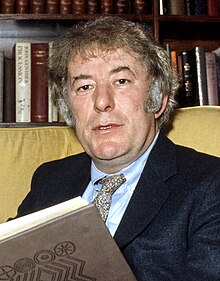Seamus Heaney
Irish poet, playwright, translator, lecturer (1939–2013)
Seamus Justin Heaney (13 April 1939 – 30 August 2013) was an Irish poet, playwright, and translator. In 1995 he won the Nobel Prize in Literature.

Poetry Quotes
editTo see myself, to set the darkness echoing.
No glass of ours was ever raised
To toast The Queen.
The longed for tidal wave
Of justice can rise up
And hope and history rhyme.
Death of a Naturalist
edit- The cold smell of potato mould, the squelch and slap
Of soggy peat, the curt cuts of an edge
Through living roots awaken in my head.
But I've no spade to follow men like them.
Between my finger and my thumb
The squat pen rests.
I'll dig with it.- "Digging", line 25, from Death of a Naturalist (1966).
- God is a foreman with certain definite views
Who orders life in shifts of work and leisure.- "Docker", line 10, from Death of a Naturalist.
The Cure at Troy
edit- Human beings suffer,
they torture one another,
they get hurt and get hard.
No poem or play or song
can fully right a wrong
inflicted or endured.- "Doubletake" from The Cure at Troy (1990) - The Cure at Troy excerpts
- History says don't hope
On this side of the grave.
But then, once in a lifetime
The longed for tidal wave
Of justice can rise up
And hope and history rhyme.
So hope for a great sea-change
on the far side of revenge.
Believe that a further shore
is reachable from here.
Believe in miracles
and cures and healing wells.- "Doubletake", from The Cure at Troy (1990)
- Call the miracle self-healing:
The utter self-revealing
double-take of feeling.
If there's fire on the mountain
Or lightning and storm
And a god speaks from the skyThat means someone is hearing
the outcry and the birth-cry
of new life at its term.- "Doubletake", from The Cure at Troy (1990)
Other Quotes
edit- Here is the great paradox of poetry and of the imaginative arts in general. Faced with the brutality of the historical onslaught, they are practically useless. Yet they verify our singularity, they strike out the ore of self which lies at the base of every individuated life. In one sense the efficacy of poetry is nil – no lyric has ever stopped a tank. In another sense it is unlimited. It is like the writing in the sand in the face of which accusers and accused are left speechless and renewed.
- "The Government of the Tongue", in The Government of the Tongue: selected prose, 1978-1987 (1989).
- My poetry journey into the wilderness of language was a journey where each point of arrival turned out to be a stepping stone rather than a destination.
- From Nobel Prize for Literature speech 1995
- The writing of certain poems took me to the bottom of myself, something inchoate but troubled. [...] The Troubles, you might say, had muddied the waters, but I felt these poems ["The Guttural Muse" and others] arrived from an older, deeper, cleaner spring.
- I don't mean sound as decoration or elaboration, but the actual cadence that moves the thing along.
- Stepping Stones: interviews with Seamus Heaney by Dennis O'Driscoll, Faber and Faber, 2009.
- Is there life before death? That's chalked up
In Ballymurphy. Competence with pain,
Coherent miseries, a bite and a sup,
We hug our little destiny again.- "Whatever You Say, Say Nothing", line 57, from North (1975).
- I rhyme
To see myself, to set the darkness echoing.- "Personal Helicon", line 19, from Eleven Poems (1965).
- Don't be surprised if I demur, for, be advised
My passport's green.
No glass of ours was ever raised
To toast The Queen.- An Open Letter (1983), p. 9.
- Objecting to his inclusion in The Penguin Book of Contemporary British Poetry.
- Don't be afraid.
- Latin: Noli timere.
- Last words; a text to his wife. Daily Telegraph report.
Quotes about Heaney
edit- A poet for whom sound is crucial, who relishes the way words and consonants knock around together.
- Tim Nolan 'New Hibernia Review' vol 13, no 3 2009
- Heaney has the rare capacity to improvise sentences which are at once spontaneous and shapely, play and profound, beautiful and true.
- Introduction-'Stepping Stones ' Interview bio by Dennis O'Driscoll Faber & Faber 2009
- För ett författarskap av lyrisk skönhet och etiskt djup, som lyfter fram vardagens mirakler och det levande förflutna.
- I didn’t find the voices in published literature in Australia that could show me the way...Heaney felt like a mentor I wish I had while I was trying to write.
- Alexis Wright Interview (2014)